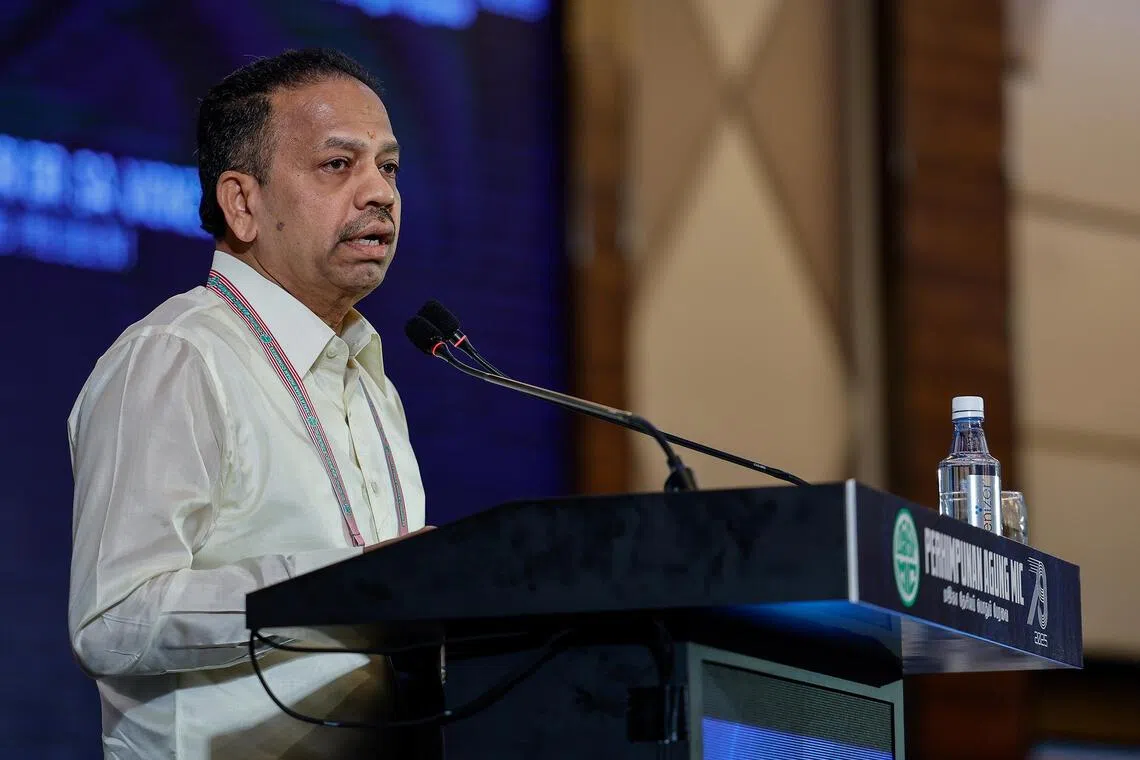Malaysian Indian Congress votes to leave BN, signals tie-up with rival coalition
Sign up now: Get ST's newsletters delivered to your inbox

MIC president S. Vigneswaran at the party’s 79th general assembly on Nov 16.
PHOTO: BERNAMA
Follow topic:
- MIC approved a motion to quit Barisan Nasional (BN) due to feeling sidelined after poor election results and Umno's perceived irrelevance to the Indian community.
- Party President S. Vigneswaran stated that MIC is considering joining Perikatan Nasional (PN), reviewing options strategically, as the BN partnership "does not work anymore".
- Analysts warn MIC faces a "dead end" regardless, needing rejuvenation as support waned post-2007, with limited influence even within new coalitions.
AI generated
KUALA LUMPUR – The Malaysian Indian Congress (MIC) has approved a motion to quit the Barisan Nasional (BN) coalition, giving the clearest signal yet that it may join rival Perikatan Nasional (PN).
The move on Nov 16 has sharpened scrutiny over the party’s political relevance and future, far removed from when it was a pillar of the BN coalition that had governed Malaysia uninterrupted for six decades.
Party president S. Vigneswaran told The Straits Times on Nov 17 that its central working committee will deliberate on the matter in December. MIC has pledged to continue supporting Prime Minister Anwar Ibrahim’s unity government until the end of his term, even if the party decides to part ways with BN.
Malaysia’s next general election is due in 2028, and may be held earlier.
Delegates passed the resolution at MIC’s annual general assembly on Nov 16, when Tan Sri Vigneswaran urged them to consider whether BN is still a viable political home.
“The existing cooperation no longer provides space for MIC to play an effective role to champion the interests of the Indian community and contribute meaningfully to national development,” Mr Vigneswaran said.
He ruled out the possibility of MIC going solo, saying the party must join another coalition if it does leave BN. However, he maintained that MIC will decide which coalition to join only if it decides to withdraw from BN, which it co-founded with Umno and the Malaysian Chinese Association over 50 years ago.
The resolution reflects deeper unease among party leaders and members who feel MIC has been steadily sidelined, after a poor performance in the 2022 general election.
Although Pakatan Harapan (PH) and BN had formed the government, nobody from MIC was appointed to the Cabinet. Its sole parliamentary seat is held by its deputy president M. Saravanan.
Reflecting on MIC’s frustrations with BN, Mr Vigneswaran alleged to ST that Umno has become irrelevant to the Indian community, having lost both direction and principles. He criticised Umno for working with former rivals without consulting its component parties MIC and the Malaysian Chinese Association, calling such moves “desperate” and inconsistent with alliance politics based on mutual respect.
Mr Vigneswaran noted that many of Umno’s traditional seats now belong to the Islamist Parti Islam SeMalaysia and Malay-based Parti Pribumi Bersatu Malaysia, forcing the party to seek survival through alliances while monopolising Cabinet posts and government-linked companies, sidelining smaller component parties.
“If you are not even considered or consulted, there is no use holding on to something that does not work anymore,” the party president said.
He added that while joining opposition coalition PN is top on the party’s agenda, MIC is reviewing all possible options carefully. It will decide on a measured and strategic approach, rather than a knee-jerk departure from BN.
MIC, founded in 1946 and among the country’s oldest political parties, served for decades as the principal political vehicle for Malaysia’s Indian community.
It has been part of BN, which governed from 1957 to 2018.
Its influence, however, has eroded sharply over the years.
It now has 450,000 members, down from some 600,000 members around 10 years ago.
Ethnic Indians represent 6.5 per cent of the Malaysian population as at the first quarter of 2025, according to the Department of Statistics Malaysia.

MIC performed poorly in the 15th general election, and party president S. Vigneswaran was not appointed to the Cabinet.
ST PHOTO: KUA CHEE SIONG
Where to next for MIC?
MIC’s soul-searching comes at a time when Malaysia’s political landscape is dominated by Malay-Muslim coalitions, leaving minority-focused parties with limited space to manoeuvre.
Yet, the party’s discontent with its current position raises a more fundamental question: whether any coalition can offer MIC the influence it seeks.
Professor Bridget Welsh, an honorary research associate at the University of Nottingham Asia Research Institute Malaysia, noted that MIC’s support began to wane in 2007 following the set-up of the Hindu Rights Action Force, a Malaysian coalition of Hindu and Indian non-governmental organisations that addresses issues faced by the community.
Prof Welsh said that MIC’s current push to reconsider its position in BN reflects a struggle for political survival amid shifting loyalties.
“The (Anwar) government has not been seen to address Indian issues. Toxic political alliances further make it hard for smaller parties as they get a raw deal in seat negotiations,” she explained.
She added that MIC now faces a strategic crossroads, where remaining with BN or exploring ties with rival PN may both be “dead end” options.
“The challenge is to reconnect with its base, rejuvenate its leadership, and use this crossroads as an opportunity. Otherwise, it faces greater irrelevance,” Prof Welsh warned.
Dr Azmil Tayeb, a political scientist at Universiti Sains Malaysia, said MIC’s prospects outside BN are limited. “It is hard to see how MIC can fare any better with other coalitions in the next general election,” he said.
He noted that ruling coalition PH would be reluctant to accept MIC, because doing so would require its current component parties to cede their seats.
Dr Azmil also said joining PN could instead place MIC in the same predicament as Gerakan – another small, minority-dominated party struggling for influence in a Malay-Muslim dominated coalition.
Although some Indian voters have swung towards PN in recent by-elections, Dr Azmil said these were protest votes against the unity government rather than affirmative support for the opposition.
Sign up for our weekly
Asian Insider Malaysia Edition
newsletter to make sense of the big stories in Malaysia.


